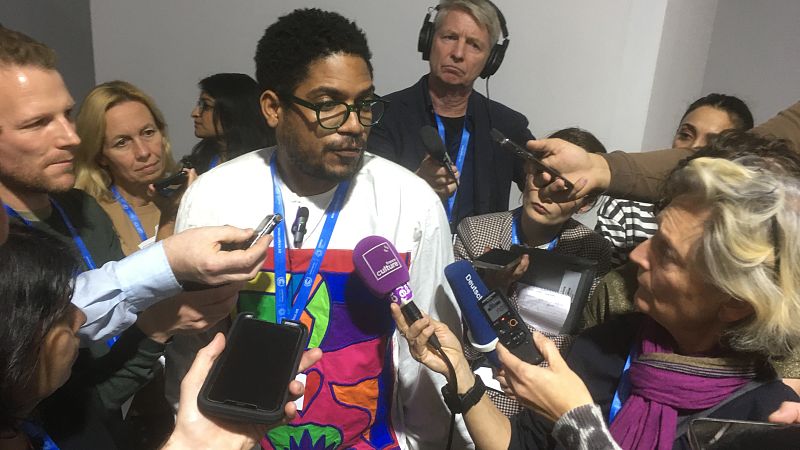COP29: Small island states ‘feel abandoned’ as climate talks grind on

A key negotiator for small island nations on the frontline of global climate breakdown and sea level rise expressed frustration today at an apparent lack of willingness for rich countries to make a bigger commitment to help.
“Across the board, everyone is trying to position themselves to get the best outcome in finance,” Michai Robertson said, suggesting different blocs were using tit-for-tat negotiating tactics in areas such as mitigation, adaptation and transparency.
This would be precisely what the chair of the UN body overseeing the talks urged the previous day, when he warned that such brinksmanship could sink the climate finance deal entirely.
The lead negotiator on finance for the Alliance of Small Islands States (AOSIS) was speaking to reporters on the sidelines of the COP29 climate summit in Baku, Azerbaijan.
AOSIS is just one group jostling for position as governments haggle over a new climate financing target for developing countries, dubbed the new collective quantified goal (NCQG), which will replace the current annual $100bn paid by advanced economies.
“We do feel abandoned,” Robertson said when asked about the impact of climate change that is already being felt.
“And you have all the developed countries saying that we cannot include in the scope of this goal the financing to address that loss and damage,” he said. “That's a really tough pill to swallow."
Developing countries want an existing ‘loss and damage’ fund, established two years ago at COP27 in Egypt, incorporated in a trillion-dollar NCQG.
UN secretary general Antonio Guterres last week dismissed the $700m dollars so far pledged by industrialised nations as a wholly inadequate sum that was“roughly the annual salary of the world’s ten best-paid footballers”.
Robertson was also sceptical about the potential of a market-based system of carbon credits, where rich countries, or companies, can pay others to cut emissions, then count them as part of their own contribution to the global effort.
The 2015 Paris Agreement to halt global heating calls for such a system to be established. Governments had been mired for almost a decade in disagreement over how it should work, until Azerbaijan claimed a diplomatic victory last week with a deal on the basic rules for a global market overseen by the UN.
The latest draft text for an agreement on the finance goal suggested that 'high integrity' carbon credits might count as climate finance for the purpose of meeting the headline target.
“It's just a transaction, but it's not the provisioning of support to address your climate action,” Michai said. At the end of the day, the country that sells the credit still needs money to further reduce emissions and meet its own mitigation obligations.
“Those kind of things are essentially not benefiting the developing country,” Michai said.
Yesterday

